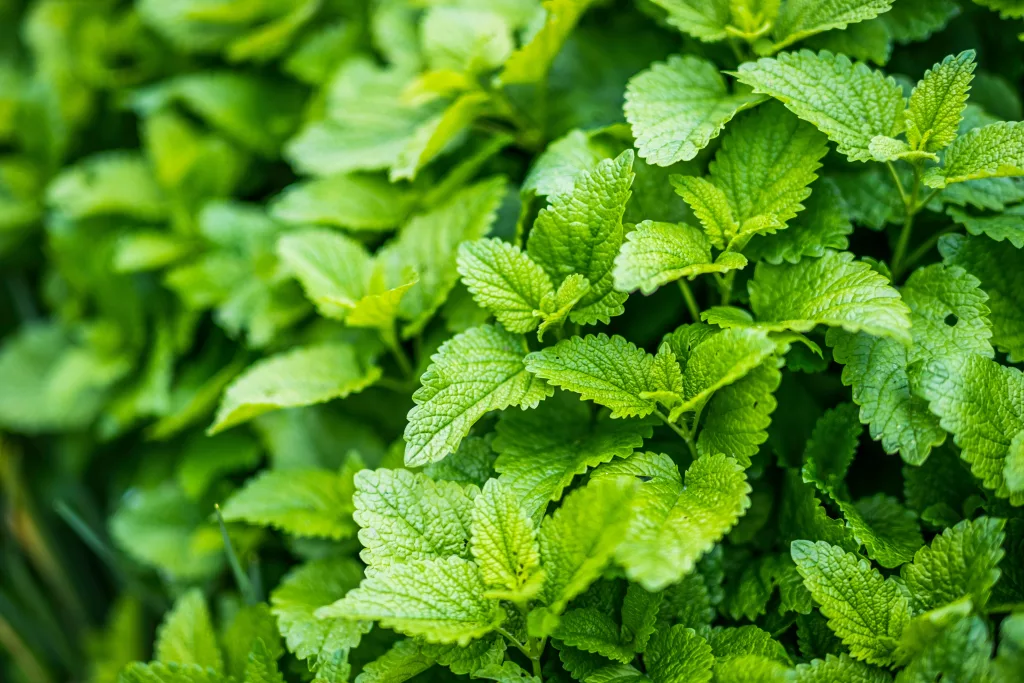
In a world filled with stress and chaos, finding natural remedies to promote relaxation and overall well-being has become increasingly important. Lemon balm, a delightful herb with a refreshing lemony aroma, is one such remedy that has been treasured for centuries for its remarkable health benefits.
In this blog post, we will explore the numerous health benefits of lemon balm, its origin, nutritional value and how it can contribute to a healthier and more balanced life.
Origin of Lemon Balm
Lemon balm, scientifically known as Melissa officinalis, has a rich history that can be traced back thousands of years. Its origin lies in the eastern Mediterranean region, including areas such as Greece, Turkey, and Iran. The plant belongs to the Lamiaceae family, which also includes other aromatic herbs like mint, rosemary, and basil.
The ancient Greeks were among the first to recognize and utilize the medicinal properties of lemon balm. They named the herb “Melissa,” meaning “honeybee” in Greek, due to its strong attraction to bees. The plant was associated with the goddess Melissa, who was considered the protector of bees. The leaves of lemon balm were often used to attract bees to hives and were believed to improve honey production.
Lemon balm’s therapeutic qualities were extensively documented by various scholars and physicians throughout history. In the Middle Ages, it became widely known in Europe and was cultivated in monastery gardens for its medicinal and culinary uses. The famous Swiss physician and alchemist Paracelsus praised lemon balm for its ability to uplift the spirits and promote longevity.

Over time, lemon balm’s reputation spread across continents. It was introduced to North America by early European settlers who recognized its value. Today, lemon balm is cultivated in many regions worldwide, including Europe, North America, Asia, and Australia.
In addition to its medicinal applications, lemon balm has also been used for culinary purposes. Its fresh, citrusy aroma and mild lemon flavor make it a popular ingredient in herbal teas, desserts, salads, and savory dishes. The leaves can be used both fresh and dried, providing a versatile herb for culinary exploration.
Lemon balm’s popularity continues to grow, thanks to its delightful fragrance and the wide array of health benefits it offers. Whether enjoyed for its soothing effects, aromatic qualities, or culinary uses, lemon balm remains a cherished herb that has stood the test of time.
Various Health Benefits Of Lemon Balm To Our Body
1. Soothes Anxiety and Promotes Relaxation:
Lemon balm is renowned for its calming properties, making it an ideal natural remedy for anxiety and stress-related issues. The herb contains compounds that interact with specific receptors in the brain, promoting a sense of tranquility and relaxation. Research suggests that lemon balm may help reduce anxiety and improve mood by increasing the availability of gamma-aminobutyric acid (GABA), a neurotransmitter that regulates relaxation.
2. Enhances Sleep Quality
If you struggle with insomnia or have trouble getting a good night’s sleep, lemon balm may be the solution you’ve been searching for. Its gentle sedative effects help relax the mind and body, making it easier to fall asleep and enjoy a more restful night. Drinking a cup of lemon balm tea before bedtime can create a soothing bedtime ritual, preparing your body for a deep and rejuvenating sleep.
3. Supports Digestive Health
Lemon balm possesses carminative properties, which means it can aid in digestion and alleviate digestive discomfort. It may help reduce bloating, gas, and indigestion, making it an excellent herb for those who suffer from gastrointestinal issues. Additionally, lemon balm has been used traditionally to calm and soothe an upset stomach, reducing nausea and promoting overall digestive wellness.
4. Boosts Cognitive Function
The unique compounds found in lemon balm have demonstrated promising effects on cognitive function. Research suggests that lemon balm extract may improve memory and enhance mental alertness. It has been used traditionally to alleviate brain fog and improve focus. Regular consumption of lemon balm tea or supplements may support cognitive health and overall brain performance.

5. Relieves Headaches and Muscle Tension
Thanks to its relaxant and analgesic properties, lemon balm can provide relief from tension headaches and muscle tension. Applying lemon balm essential oil topically or using it in a warm compress can help ease headaches, reduce muscle spasms, and alleviate discomfort. Its calming aroma also contributes to stress relief, further enhancing the effectiveness of this natural remedy.
6. Antioxidant and Anti-inflammatory Benefits
Lemon balm is packed with antioxidants that help protect the body against oxidative stress and the damaging effects of free radicals. These antioxidants, such as rosmarinic acid, can help reduce inflammation in the body, supporting overall health and longevity. Regular consumption of lemon balm may contribute to a stronger immune system and reduced risk of chronic diseases.
Nutritional Value of Lemon Balm
Lemon balm (Melissa officinalis) is a herb that offers more than just its pleasant aroma and calming properties. While it is not typically consumed in large quantities, lemon balm does contain several beneficial nutrients. Here’s an overview of the nutritional value of lemon balm:
Vitamins:
- Vitamin C: Lemon balm leaves contain a moderate amount of vitamin C, which is an antioxidant that supports the immune system and aids in collagen production.
Minerals:
- Calcium: Lemon balm is a good source of calcium, which is essential for maintaining healthy bones and teeth, as well as proper nerve and muscle function.
- Iron: Lemon balm contains a small amount of iron, which is necessary for red blood cell production and oxygen transport in the body.
- Potassium: This mineral is present in lemon balm and is important for maintaining fluid balance, proper heart function, and nerve signaling.
- Magnesium: Lemon balm provides a small amount of magnesium, which is involved in hundreds of biochemical reactions in the body and contributes to muscle and nerve function, as well as energy production.
Essential Oils:
- Lemon balm contains essential oils, including citronellal, geranial, and neral, which contribute to its distinct lemony fragrance and flavor. These essential oils are known for their antimicrobial and antiviral properties.
Flavonoids and Phenolic Compounds:
- Lemon balm contains various flavonoids, such as rosmarinic acid, apigenin, and luteolin. These compounds have antioxidant properties and help protect the body against oxidative stress and inflammation.
While the nutritional content of lemon balm may not be exceptionally high, its value lies in its phytochemical composition and the potential health benefits associated with these compounds. It is worth noting that the specific nutrient content may vary depending on factors such as the plant’s growing conditions, age, and preparation methods.
It’s important to remember that lemon balm is typically consumed in small quantities, such as in herbal teas or as a seasoning in culinary dishes, so it should not be relied upon as a significant source of nutrients. Nevertheless, its unique combination of compounds contributes to its therapeutic properties and makes it a valuable addition to a balanced and healthy lifestyle.
Conclusion
Lemon balm, with its delightful lemony scent and myriad of health benefits, is truly a gift from nature. From promoting relaxation and sleep to supporting cognitive function and digestive health, this versatile herb offers a wide range of advantages.
Whether enjoyed as a soothing tea, incorporated into recipes, or used in essential oil form, lemon balm is a valuable addition to any wellness routine. Harness the power of lemon balm to find tranquility and balance in an increasingly fast-paced world.
Embrace its natural benefits and experience the wonders of this remarkable herb.
Did you find this helpful? Let us know in the comments.
You can also visit our Facebook and YouTube pages to know more about plants and their health benefits.
You might also like:
- The Miraculous Mimosa Tree: Unveiling Its Medicinal Uses and Origin
- 5 Reasons Why You Should Be Practicing Mindful Eating
- Safflower vs. Saffron: Compare Its Health Benefits, and Nutritional Value
- Understanding MS: 7 Signs And Symptoms of Multiple Sclerosis (MS)
- Exploring 5 Medicinal Uses of Dandelion and How to Use It








